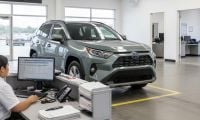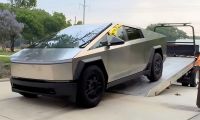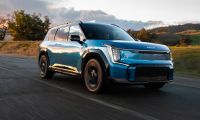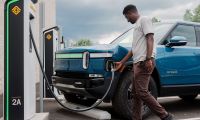The Japanese Prime Minister Yoshihide Suga wants to reduce CO2 emissions. From 2030, only electric and hybrid cars will be allowed. This gives the Japanese car companies a lot to think about, to accelerate their EV programs and now think how they can catch up and pass Tesla in making high-tech electric cars. But if you want to know more about why cmopanies like Toyota don't make EV right now, see Toyota's position on EV batteries vs Hybrid batteries.
Japan wants to make car traffic in its own country less harmful to the environment. The Ministry of Economy, Trade and Industry is in the process of working out the goal of no longer allowing gasoline-powered new vehicles in the mid-2030s, the Japanese TV station NHK reported on Friday.
Instead, all car traffic should be converted to more environmentally friendly drive systems such as electric and hybrid cars. The third largest economy in the world before Germany wants to take the lead in the worldwide abolition of gasoline engines by setting clear targets.
Japan aims to reduce its greenhouse gas emissions to zero by 2050. The previous government had aimed to reduce emissions by 80 percent by 2050. Responding to global warming is no longer an obstacle to economic growth, Suga said. “We have to change our attitude”.
Proactive measures would bring about changes in the industrial structure and economy and lead to strong economic growth. The government says the targets require fundamental changes in business models. This means huge automotive manufacturers like Toyota and Honda should immediately boost their EV research and developments, even more than what they are already doing. The Japanese government vows to achieve 80% emissions reduction by employing all policy tools, including tax, fiscal and financial measures.
Resisting Toyota Chief's EV Vision
The World Street Journal notes that this statement by the Japanese government bucks Toyota chief Akio Toyoda who recently said a rapid shift to electric vehicles could cripple the car industry.
Speaking at a conference for the Japan Automobile Manufacturers he said there are two components to his complaints against turning the entire automobile industry into electric cars too soon. The first is today's high cost of an electric vehicle. Even the lowest prices Tesla goes for more than $38,000 without government subsidies. It's true that Tesla CEO Elon Musk has promised to unveil a $25,000 compact Tesla model. But to get to that point Tesla must be successful in lowering not only the cost of its electric battery but other features as well. Even if you lower the cost of the battery pack from $12,000 to $6,000 it would only bring down the cost of a Model 3 to $30,000. That's not far from the target $25,000 compact price, but Tesla needs to find other ways to shed another $5,000 and still make a profit.
Toyoda's second point at the conference was that even if the world did go all-electric the electricity grid couldn’t handle extra summer demand and he observed that most of Japan’s electricity is generated by burning fossil fuels. Thus, something needs to be done in this regard.
Follow Tesla Or Your Own Path
This leaves Toyota no other option, but to either follow Tesla or create its own EV path, just like it successfully did with hybrid cars.
Tesla recently announced its new 4680 battery at the September Battery Day and Panasonic is apparently already building them. The charging time of these new Tesla batteries is reduced from 25 minutes to 15 minutes. If you only need a 50% charge, you can be done in 7 minutes. That’s almost as fast as gas. Toyota, we learned recently, is also working on new and game-changing solid-state batteries, which the company plans to unveil in 2021. Torque News Toyota reporter Peter Neilson says Toyota's new batteries and own electric vehicles will crash Tesla.

"Toyota is a company that does not do anything until they know for sure it will work. Toyota went longer than every other manufacturer before putting Lithium-Ion batteries in their hybrids. Why? Toyota believed it was not developed enough yet. Thinking on that idea, Toyota is now rolling out a solid-state battery. This bit of knowledge tells me that Toyota has been researching this for years and kept it under wraps. They are ready to present the world with the next big thing in transportation. Tesla may be the first car to be synonymous with EV, but Toyota is the wise Sensei who keeps showing the apprentice new things," concludes Neilson in a recent article at Torque News.
Others, who claim to understand a thing or two about EV batteries, say things like Toyota's battery prototype may be exciting, but solid-state is a decade from mass manufacturing. "Solid-state has many issues including low-temperature charging, scalability, and cost. Ultimately solid-state will most likely be a niche product and not a mass scale and broadly used EV battery because of these difficulties. Tesla is working on battery tech that can be scaled massively and they are now the largest battery company in the world, not Toyota who dismissed full EV and Tesla at their own loss," commented a user named Ron, under Neilson's article, who claims to be a battery researcher.
Currently, Toyota is using Li-ion batteries. It's true that Tesla may know more about current Li-ion battery technology than Toyota, but Toyota, with over 1000 solid-state patents, knows a lot more about solid-state batteries, which is the future of electric vehicles and is what will bring EVs into the mainstream.
In any case, with the recent decision of the Japanese government aiming to eliminate gasoline vehicles by the mid-2030s and boost green growth, Toyota has two choices. Either it will quickly convert into an electric vehicle producer following Tesla's example, or it will chart its own path. I think Toyota will chart its own path and turn into a strong EV player in the electric car global market. Whatever happens, the consumers and the global environment will benefit. Toyota will greatly benefit as well if it plays smart, amplifying its EV department's R&D. As a result we will have more electric cars on our roads, more competitors in the market, and cleaner air to breathe.
Which path do you think Toyota will choose? What do you think Tesla will do by 2030?
Armen Hareyan is the founder and the Editor in Chief of Torque News. He founded TorqueNews.com in 2010, which since then has been publishing expert news and analysis about the automotive industry. He can be reached at Torque News Twitter, Facebok, Linkedin and Youtube.
Set as google preferred source












Comments
The current battery
Permalink
The current battery technology serves perfectly fine for any reasonable person who understands that there is always going to be a trade of between different class of products: i.e with ev's you only going to charge outside your house or office, only a handfull of time a year. Surely converting more public and condominium parking spots to ev charging ( even if only 2nd stage) would do more for ev adoption than improving range . As a condo dweller it does me no good to have an ev if I can not plug it overnight in my 70's build highrise. It's just to much hassle. I probably do 5000 kms a year or less of out of city travel and I could easily plan to stop every 300 kms for 30 minutes, but during my daily drive I do not want to go to a charging station 3 blocks from my apartment that serves 3 cars and find them more often then not occupied.This is the biggest issud with city dwellers and ev adoption.
Fix this issue in high density cities and ev adoption will explode.
Stefan. I got my board to
Permalink
In reply to The current battery by Stefan A (not verified)
Stefan. I got my board to agree to allow me to install a 120 V outlet at my parking spot and charge me a fee for my electric consumption. I can charge at 10 km per hr. Typically my car is parked overnight for 14 hrs. Occasionally I travel a little more than that in a day and I charge mid day at a 240 V charging station. This system works well.
Toyota's loophole is hybrids.
Permalink
Toyota's loophole is hybrids. They can still keep making hybrids after 2030 so will then have another 2 decades to go full electric by 2050. Toyota is already leading the world in hybrid tech so replacing all its gas powertrains with hybrid powertrains when many of their models already have the hybrid option will be fairly easy. In the meantime they can continue research to perfect solid state batteries and leapfrog Tesla some time between 2030 and 2050.
2030 is way to early, maybe
Permalink
In reply to Toyota's loophole is hybrids. by Greg (not verified)
2030 is way to early, maybe 2100 is possible to achieve. The distribution system is by far the largest and most complicated part of the electricity system in every part of the world and must be expanded and renewed everywhere before fossil transportation could be banned.
I believe the electricity
Permalink
In reply to 2030 is way to early, maybe by Jan Andersson (not verified)
I believe the electricity distribution system is already well established in Japan, and most other countries. Most houses have their own power supply and multiple power outlets. Interestingly most EV owners, myself included, hardly notice the difference to their household power consumption such are the efficiency of EV's.
I agree with your loophole
Permalink
In reply to Toyota's loophole is hybrids. by Greg (not verified)
I agree with your loophole comment. To drive the change Japan should follow Europe's example and set ever stricter emissions targets at 5 year intervals, that effectively make the continued development of ICE and hybrid technologies impossible.
I'm not adverse too EVs but
Permalink
I'm not adverse too EVs but you'll have to admit that our power grid and the cars are not quite ready for prime time. and has anybody ever measured the amount of heat energy coming from the sun today compared to 10 or 20 years ago. Cuz if our if our situation of global warming is due to the sun then it does make a bit of difference what we do here on Earth. Something to think about
"...global warming us due to
Permalink
In reply to I'm not adverse too EVs but by Chef Scott (not verified)
"...global warming us due to the Sun" says you??? Oops...
Since when does the company
Permalink
Since when does the company with the best hybrid technology have to follow Tesla? The smartest thing Toyota can do until 2030 is expand the Prime family. They'll be able to make 4 times as many big-battery PHEV's with their limited battery supply. And when the demand for PHEV's has been met, Toyota can ease into the EV market. So what if a few EV companies sell more EV's than Toyota for 5 years or so? Toyota will be selling plenty of electrified vehicles and profiting from them as they develop solid-state batteries for EV's and dig deeper into the hydrogen space, which will mostly benefit the transportation industry. If solid-state batteries are expensive and difficult to produce at first, they'd be better off in PHEV's and high-end EV's until the cost and production problems are solved.
"Toyoda's second point at the
Permalink
"Toyoda's second point at the conference was that even if the world did go all-electric the electricity grid couldn’t handle extra summer demand and he observed that most of Japan’s electricity is generated by burning fossil fuels. Thus, something needs to be done in this regard."
That 'something' is nuclear energy. It is our future, after all. Despite the high initial cost of building very safe, new-tech nuclear reactors, the major polluters of the world will eventually realize all the other renewable energy sources won't be able to dramatically reduce the use of fossil fuels in a world with an increasing thirst for energy. Wind and solar power have created more problems than anticipated. Countries like Germany with accelerated green energy programs have recently found that out. The immense amount of energy stored within the atom will not be ignored for long. Unfortunately, it may take a few more decades for the world leaders to realize nuclear power is the Holy Grail.
Energy consumption is mass
Permalink
Energy consumption is mass dependent( basic physics, long established EPA data). Thus, cars weighing an additional 1500# due to the 50x lower energy density of batteries vs gasoline, make no sense. The costs of expanding powerplants, and the grid, are accordingly going to be higher due to this overweight condition. Smarter to wait until electric cars are equal in mass, have succeeded in their diet plan.
The irony, most of Tesla
Permalink
The irony, most of Tesla battery providers are all Asian companies. The Japanese, Korean and the Chinese. The Chinese and Korean are very serious in pushing their EVs, while The old dogs like legacy American car companies, European and Japanese car companies are lagging behind. I guess now we know where the future is. Not the old car companies that can't adapt to new market, they always think selling bigger ICE cars or pick up trucks will keep the door open. Unfortunately many younger ppl realized that their future is at stake either they adapt to climate change or they have to suffer because what the older generation did in the past. Some govt or state actually realized that too.
Teslas real advantage is
Permalink
Teslas real advantage is their CEO, and their ability to invent and develop at break neck speeds. No other company in the world can match them. SpaceX is a prime example. Elon can access space for 1/50th the cost of what the great USA could do it for. If the whole country of USA is no match for Elon, legacy auto manufacturers with dated philosophies don't stand a chance. For anyone to assume that Tesla is not developing solid state batteries is in a world of pain. Elon is in the business of disruption through engineering and implementation. Tesla is not just a car manufacturer.
Competing with words is lame
Permalink
Competing with words is lame and consumers are aware of this. Bring an EV product to market, sell it in volume and then let's talk about which product is better.
Europe is behind making
Permalink
Europe is behind making batteri, sure, but they make a lot of ev cars.
Because of the Danish taxis, Tesla 3 sr cost 350.000,-kr. (47.000 euro) And BMW 3 series cost from 446.000,-kr.(60.000 euro) therfor is it a good ide in Denmark.
The battery itself is a
Permalink
The battery itself is a problem when it reaches to its end and recycle. But the hydrogen fuel will become the winner and you don’t have to wait that much time to refuel. Toyota will become the winner after they put up all the gas stations to support these vehicles.
Hydrogen fuel cells won't
Permalink
In reply to The battery itself is a by Alan Pastor (not verified)
Hydrogen fuel cells won't take off because they're still very impractical. There's the fuel source problem. If you get it from natural gas, it's cheaper, but not "green". If you get it via electrolysis, it takes about 4x the electricity to split the hydrogen, compress it, truck it to the fueling station, then recombining the hydrogen with oxygen in the vehicle. Lots of energy conversion losses along each step
So to do all that to drive that hydrogen car 1 mile, you could've driven a battery electric car 4 miles if you just simply used the electricity to charge up a battery.
The refueling time is also only true for the first 1-2 cars. After that it takes some time for the machines to compress the hydrogen to a usable level, which can be anywhere from 20-60 minutes.
Toyota isn't really helping to pay for infrastructure costs, at least in the US. That's why there's only a few dozen stations, all of which are basically in California. Each station itself costs around $2-3 million to build.
Yes, they help cover the cost of the hydrogen, but you have to wonder why you get $15k in fueling for the first 3 years or during the lease period. And what will that hydrogen cost you in year 4 of ownership and beyond? You're also limited in where you can drive because of this, and a Mirai lessee/owner can borrow a Toyota gas car for longer trips. And there's this thing called "hydrogen embrittlement" that will wear out components on the car and especially the fueling equipment, since hydrogen doesn't like to be contained.
Contrast that charging stations, especially Tesla's Supercharger network, built and paid for entirely by them. With that, you can travel through most of the US, and many other parts of the world. Sure, it takes 15-30 minutes per charge, but you're probably also using the bathroom, stretching your legs, or eating/drinking at that time. And there's always in-car entertainment such as Netflix, YouTube, Twitch, games, that you can do to pass the time.
As for home charging, yes, it takes hours to charge. But you're probably sleeping, eating, watching tv, surfing the net, playing games, during that time. Yes, not everyone owns a garage or driveway. But public chargers are slowly but surely cropping up in more places. They can also be easily installed in a parking lot/complex, whereas a hydrogen fueling station needs to be built far away from residential areas due to the explosion risks.
Finally, there's the cost of hydrogen fuel cell vehicles. They're typically in the $50k+ range, and don't have a lot of performance for that price point. Sure, not everyone needs a fast 0-60, but most people would probably rather drive a Model 3 than a Mirai if you asked them. Look at how many Mirai have been made/sold around the world. Then look at how many battery electric cars have also been made/sold in that same time frame.
Bottom line is that hydrogen fuel cell cars sound promising on paper, but in reality they're at significant disadvantages in terms of cost of the vehicle, cost of installing fueling stations, cost of maintenance, and cost of fuel. The fast filling time Toyota loves to promote is slowly being caught up by battery electric cars, and they're wasting tons of money and resources on this instead of investing it into battery electric cars.
I can't buy or lease a Mirai in the Midwest. But my Tesla Model Y charges up just fine in my garage, and I have the Supercharger network if I ever want to do longer trips. And I've done a 564 mile road trip just recently thanks to that.
Lover the article. And want
Permalink
In reply to Hydrogen fuel cells won't by Ash (not verified)
Lover the article. And want to use it to teach my students in 7th grade English. Please explain/help me to understand your typos?
You spelled Toyota...Toyoda and Companies...Conadies
Thank you,
Mr. Zepeda
Toyota had plainly started
Permalink
In reply to The battery itself is a by Alan Pastor (not verified)
Toyota had plainly started that they will NOT build out hydrogen refueling stations at their own expense. They expect the taxpayers to pay for that, at $1-2 million per station. Superchargers are 20x less expensive, which enabled Tesla to cover the map with them in just a few years. If Toyota can't join the EV revolution tout de suite, they're toast.
Hope solid state works but
Permalink
Hope solid state works but the tech is way over hyped considering there is no volume, production, application experience or economic evidence if how or when it might work in real life.
It remains to be seen if
Permalink
It remains to be seen if total EV is the best solution or hybrid/plug in hybrid in the future. EV hype could be exaggerated much due to Tesla's success, which is out of reach for most of consumers.
EV will be mainstream in time
Permalink
EV will be mainstream in time. They have to equal ICE performance. In terms of purchase price, and ease of use of people who unplugged.... condo/apartment dwellers.
The green and carbon tax angle that EV proponents mention are weak. I'm not talking about it takes Fossil fuel to make eletrcity. In talking that a carbon tax should be also taxed on countries who extract oil. Norway announced a 10% increase on oil production. why is Norway not subject to a carbon tax?
The problem with catching
Permalink
The problem with catching Tesla never mind passing them is the plain and simple fact that they are not sitting still. The “competition” is years behind, You need a rocket strapped to your r&d department to even try and catch up. Anyone know a guy with a rocket company? ;)
You gentlemen and the writer
Permalink
You gentlemen and the writer missed the real alternative. Hydrogen fuel cell vehicles will Crush Elon and Battery Bots